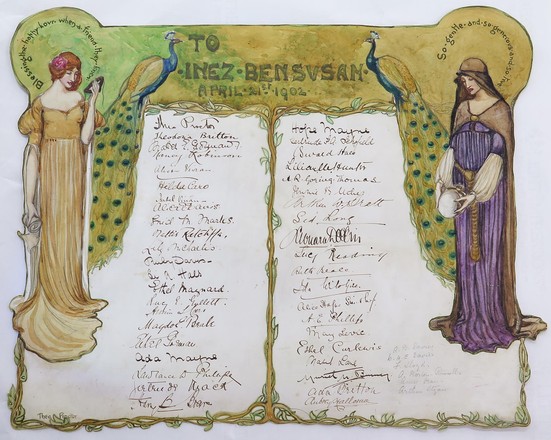

In May 1902, promising young local actress Miss Inez Bensusan (1871-1967) left Sydney for America, en-route to furthering her career on the London stage. Before her departure, 50 friends hosted a 'bon voyage' party at the Hotel Australia where, after some dainty refreshments, Mrs Percy Hunter presented the guest of honour with this exquisitely illuminated scroll – ‘a souvenir of Miss Bensusan’s Australian friends’.
The work of Sydney artist Thea Proctor, the painted decoration on this scroll is comprised of peacocks, with standing figures of 'Tragedy' and 'Comedy' surrounding a verse from William Makepeace Thackeray’s The Pen and the Album, and signed by 42 of the assembled guests – many of whom were among the cream of young, intellectual and artistic Edwardian Sydney society.
Inez Bensusan (1871-1967) was a feminist theatre practitioner born in Sydney, Australia, the sixth of ten children in the large and wealthy Jewish family of mining agent, Samuel Levy Bensusan and his wife Julia. Inez began her amateur performing career in Sydney and, sometime after 1893, travelled to Britain where she studied under Miss Loveday; a few months later she was engaged at the Adelphi Theatre, making her first recorded performance on the London stage in 1897. She would subsequently perform in over 50 productions, between 1897 and 1938, including many suffrage classics.
In 1898 Bensusan returned to Sydney for an extended visit and to participate the wedding of her brother, Arthur Bensusan to Ethel de Lissa; the couple married in October 1898, with the De Lissa (Haidee and Lillian) and Bensusan sisters (Inez and Orovida) as bridesmaids, before moving to London in 1901. Bensusan made her first professional appearance on the Sydney stage in April 1898, performing at the Lyceum Theatre, and continued her Australian career into the new century. By 1902 Bensusan was contracted with the Charles Arnold Company at the Palace Theatre, at the termination of which she returned to the London stage, travelling via New York. It was on this occasion that presentation of this illuminated scroll was made to Bensusan by her Sydney friends.
Australia led most of the world in the achievement of womanhood suffrage. Australia feminists abroad enjoyed a unique status as enfranchised women and Australian feminist theatre practitioners played a significant role in the development of early feminist theatre. The impressive achievements of suffrage feminists in Australian theatre are a little known story, as is their contribution as expatriates to the development of international women's theatre of this time.
Inez Bensusan had become an active campaigner for women's suffrage through the Jewish League for Women's Suffrage, the Australian and New Zealand Women Voters and, most centrally, made a vital contribution to the work of the Actresses Franchise League (AFL), developing and running the Play Department In 1913. Bensusan set up the Women's Theatre, launched at the Coronet Theatre that December, which aimed to establish a permanent season of work dealing with women's issues. During World War I she worked with the first Women's Theatre Company to perform for the Army of Occupation in Cologne and then played with the British Rhine Army Dramatic Company for three and a half years. She later moved to Chiswick where she was joint founder, in 1946, of the House of Arts.